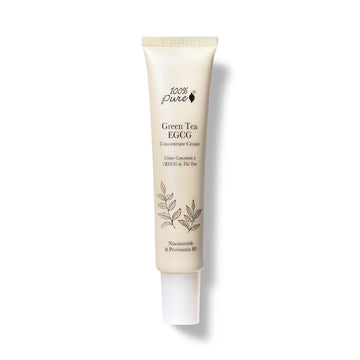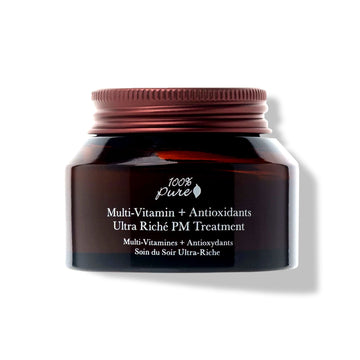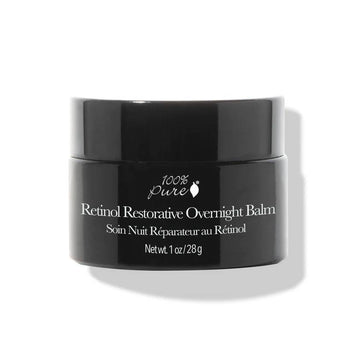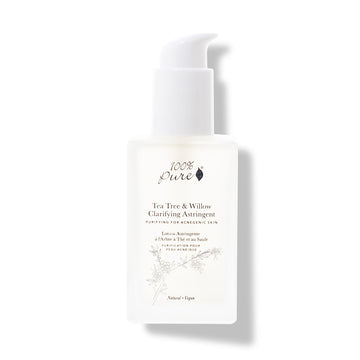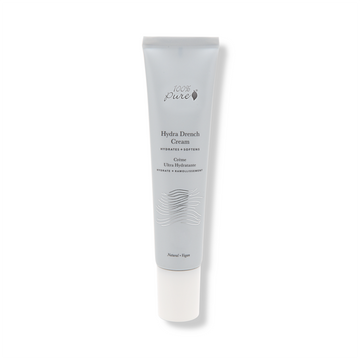Unlock the Secret to Balanced Skin: Mastering Overnight Hydration for Oily Complexions
Posted on October 1, 2024 Written by: 100% PURE®
Dreamtime is prime time for skin. If you think your skin is drifting off while you’re sleeping, it’s actually busy stretching the limits or repair and renewal. Does that mean to unburden it with a nightly skincare routine and let your busy dermis breathe? It doesn’t matter if you have complexion Zen or you’re on a ‘path of awakening’ to greasy skin, you need overnight hydration – even if you have oily skin.
A common misconception is that oily skin doesn’t need moisture. We know it seems counterintuitive to add a moisturizer on top of an already oil-slicked complexion. We also understand the frustration with waking up to greasy skin. The truth is, that oily skin needs a moisturizer to seal in nutrients and water, and to balance sebum (your skin’s natural oil) production so you can stay shine-free.
A nighttime skincare routine is going to be especially important for skin balance for oily skin. By adding non-comedogenic moisturizers to your nightly skincare regimen, you’ll be waking up to balanced, healthy-looking skin in no time from your dreamtime. Let’s cover oily skin’s nighttime moisturizing needs – if you snooze on it, you’ll lose it!
Understanding Oily Skin's Nighttime Needs
No matter your skin type, glowing skin is in! But when your not-so-little secret glow-up may be coming from excess oil in your skin, it can be a bit of a blow-up of frustration and confusion. Oily skin is not rare, and it can be controlled and managed once you understand some of your skin’s greasy tactics!
Oily skin occurs when the sebaceous glands produce an excess amount of sebum that naturally lubricates and protects the skin. The overproduction of sebum can lead to enlarged pores, excess shine, and blemishes. Since sebum has a slightly sticky texture, pores can become a breeding ground for bacteria, meaning prime conditions for breakouts and acne. The way oily skin behaves is why it needs a day and night skincare routine – and nighttime moisturizing is particularly important!
It turns out that even when our body is at rest, our skin is busy recovering from a hard day’s work. This makes it essential to have a proper nighttime skincare routine! Sleep repairs you and your skin. While you’re getting a good snooze, your skin is working at a cellular level to recoup and recover itself for a new day. Your body boosts blood flow to the skin, which means you wake glowing or glowing too much.
While you’re getting your beauty sleep, the process of cell mitosis or cell division (that occurs to renew and repair skin) is at its peak. This includes the shedding of dead skin cells and subsequently replacing them with younger cells. Good morning vibrant, rejuvenated skin!
While some skin functions are on the up-flow while we sleep, Transepidermal Water Loss (TEWL) increases, and sebum production slows down. Since our immune system is in overdrive working to renew itself (or fighting infections or viruses) your skin’s ability to maintain adequate moisture decreases, which is why a nighttime skin routine is so important – and why oily skin needs moisture.
It may seem like moisturizing oily skin is like adding grease on grease. But on the contrary, nighttime moisturizing is crucial, as this is the time skin can repair and renew itself, and maintain oily skin’s health and balance. Skin-stripping products, pollution, and UV rays can damage your skin’s moisture barrier. As a result, your skin won’t be able to retain water and stay properly hydrated. To compensate, your skin begins to overproduce sebum, which can result in greasy skin, clogged pores, and acne.
If you’re not using a non-comedogenic moisturizer at night, you can cause your skin to produce more oil to hydrate itself. This is because oily skin can lack water and become dehydrated, and it compensates for it by producing even more oil, exacerbating the issue. Nighttime moisturizing helps to hydrate the skin without clogging pores or adding unnecessary shine. This keeps the skin adequately moisturized and prevents it from dehydration, which can trigger the overproduction of sebum.
The key to the science of skin hydration is adding a moisturizer to your nighttime skin routine to help balance sebum production so you can stay shine-free. The best moisturizers for oily skin will properly balance and nourish, without clogging pores or leaving skin feeling greasy. Choosing non-comedogenic moisturizers will also help with oil and hydration for your skin, which have different roles.
Oil and hydration are not the same, and in fact, these terms are often used interchangeably but they actually refer to different states within the skin. The term hydration refers to water content, while moisture pertains to oil. There’s a difference between moisture and hydration, and every skin type needs some of both.
Hydrating involves feeding skin water for healthy cell function, and to prevent dryness, which can lead to the formation of fine lines and wrinkles. On the other hand, moisturization is adding oil to reinforce your skin’s moisture barrier and prevent water from evaporating from your skin. If your skin needs water it requires hydration, and if it lacks oil it's in need of moisture.

Choosing the Right Nighttime Moisturizer
Finding the right nighttime moisturizer for oily skin can be a slippery slope. It requires striking a delicate balance, so you don’t slip too much down on the oily end or the dry side. You want something nourishing enough to keep skin hydrated, but not so heavy that it will make it feel even greasier.
As far as ingredients go, humectants like glycerin, aloe, and more are great choices for oily skin as they attract water to the skin's surface to provide hydration without any occlusive properties that could contribute to breakouts. Check out some of the top ingredients for oily skin and their benefits.
Key ingredients for oily skin
If you have oily skin, hyaluronic acid is one of the best ingredients for oil-free hydration. to help hydrate your skin and boost your skin barrier. Often referred to as a "moisture magnet," hyaluronic acid has the remarkable ability to hold up to 1000 times its weight in water, making it an exceptional hydrating agent with unparalleled moisturizing properties.
If you have oily skin, using products that contain hyaluronic acid can significantly reduce the need for your skin to overproduce oil in response to lacking water. Acting as a humectant, the lightweight and hydrating skin hero retains water on the skin's surface and boosts your skin barrier, providing a plump and youthful appearance.
Niacinamide for sebum regulation:
Excess oil production is a common bedfellow of oily skin, which can lead to large or clogged pores and even acne. That’s why you might notice that your pores are more visible in your t-zone area, which is where we tend to be oilier. If your face isn’t cleansed or exfoliated properly, sebum can clog your pores. It combines with dead skin cells and bacteria, forming the painful whiteheads or inflamed red pimples we know as acne. Clogged pores can also oxidize, creating blackheads.
Niacinamide is a powerhouse in regulating sebum production. Too much oil can clog pores, cause inflammation, and lead to acne. Niacinamide helps stop oil production from going into overdrive, which can help prevent blemishes from appearing in the first place. The water-soluble vitamin can also help produce ceramides, which are components of the epidermal permeability barrier, which helps maintain the skin's hydration and integrity.
Lightweight, non-comedogenic oils:
It may seem very counterintuitive – or frightening – at the thought of putting oils on oil-slicked skin. Have no fear if you’re using lightweight, non-comedogenic oils like jojoba or grapeseed.
Jojoba oil is a golden liquid powerhouse when it comes to moisturizing. What's fascinating is that it mimics the natural oils our skin produces, making it a fantastic hydrator without being greasy. It's like telling your skin, "Hey, I got you covered, but I won't suffocate you in the process." This is great news for oily skin types!
This makes jojoba oil stand out, making it a botanical equivalent of a skincare twin, effortlessly blending with the skin's natural oils. Jojoba oil is more than just a moisturizer – it's a skincare Swiss Army knife. Its molecular similarity to sebum allows it to regulate oil production, making it suitable for all skin types, especially oily. The oil's moisturizing prowess is legendary, sinking into the skin without leaving a greasy residue.
Another nutrient-rich oil that penetrates the skin and helps us achieve better-balanced behavior is grapeseed oil.
As a naturally occurring skin decongestant, grapeseed oil gently removes excess sebum and dead skin cells, leaving your skin feeling clear and healthy. Grapeseed oil contains an omega-6 fatty acid called linoleic acid. Your skin barrier is composed of tons of fatty acids and lipids that help your skin retain moisture naturally.
Linoleic acid is one of the most prominent. Without them, you would develop a compromised skin barrier, and for oily skin types, that spells troubling moisture loss and the potential for the slippery slope effect we mentioned earlier.
Grapeseed oil is chock full of vitamin E, which is excellent for locking moisture into the skin. This vitamin plays an essential role in softening and hydrating the skin’s outer layer. Meanwhile, its superstar fatty acid components fortify the skin barrier while smoothing and balancing the skin.
Textures and formulations
We know that our body is mostly made up of water, so naturally, our skin is primarily made of water makes sense. With that said, we need to be using a natural nighttime facial moisturizer that caters to the water-loving disposition of our skin and which type would play nicely with it. We have lotions, gels, serums; oh, my! You may prefer the texture or formulation of one moisturizer over the other.
Let’s check each of them out so you can find your moisturizer made in mega-moisture skin heaven!
Gel-based moisturizers:
Contains a water base and is usually oil-free, which makes its texture watery and light. Gel moisturizers can hydrate your skin without clogging your pores. Because the texture is so airy and light, gel moisturizers can be applied before putting on makeup base and it won’t leave your foundation looking cakey. But due to its light texture, it evaporates quickly and you may need to apply it more frequently than the other moisturizers.
For oily skin, we look for ingredients that absorb water, preserve the skin’s existing water and hydration, and draw more moisture into the skin. Some of those ingredients, such as glycerin and aloe that we mentioned earlier are great to look for in for in the best natural nighttime moisturizer for oily skin.
Oil-free lotions:
Oil-free lotions contain more water and, therefore, have a lightweight, fluid-like texture. Many oil-free lotions still contain some oil, unless it’s a gel that specifically states it’s oil-free. Lotions sink into the skin quickly without leaving a film, making them an ideal option for daytime wear under makeup for oily skin types. They can also be nice in hot or humid climates when you may want or need less moisture.
Water-based serums with moisturizing properties:
Water-based serums can be highly beneficial for oily skin because they provide targeted treatment without adding excess oil or heaviness. These types of serums offer lightweight moisture without heaviness and often contain hydrating ingredients like hyaluronic acid, which moisturizes the skin without clogging pores.
Water-based serums can include moisturizing properties and ingredients to help with oil control, such as niacinamide, which helps regulate sebum production, reducing excess oil. These serums may also contain natural ingredients, like salicylic acid or tea tree oil, which can help prevent breakouts by keeping pores clear. Moreover, they may also contain additional actives like vitamin C or retinol to help improve skin texture and reduce enlarged pores.
Overcoming Moisturizer Fears
Let’s oily face it, sometimes “we fear what we don't understand” and that makes it tricky to comprehend the concept that even oily skin, which seems plenty or overly ‘moisturized’ and is already burdened with this heavy, oily slick needs more moisture slick. And, it’s perfectly okay; it reflects the human tendency to fear things that are unfamiliar or unpredictable.
The good news is usually this fear is caused by a lack of information, and that’s why we’re here – to help disprove it and calm your mind to overcome any moisturizer fears.
Worry about clogged pores and breakouts:
When it comes to skincare, there are many misconceptions, particularly when it comes to moisturizing oily and acne-prone skin. Many individuals with these skin types tend to avoid moisturizers altogether, fearing they will exacerbate their skin issues and cause clogged pores and breakouts.
While it’s true that certain heavy or greasy moisturizers, such as conventional moisturizers that are often heavy feeling and contain harsh ingredients, can potentially exacerbate acne, not all moisturizers are created equal. Look for lightweight, natural, non-comedogenic moisturizers specifically formulated for oily and acne-prone skin. These moisturizers are designed to hydrate without clogging pores, helping to maintain the moisture balance and Zen of the skin.
Confusion about the difference between hydrating and moisturizing:
Though the terms ‘hydrating’ and ‘moisturizing’ seem alike, they are different and work in dissimilar ways. These terms can create confusion for any skin type, especially for those with oily skin, who are already in the moisture/hydrate skin confusion zone. A simple way to differentiate these terms is to remember that hydration refers to water while moisture refers to oil.
Moisturization is essentially adding oil to the skin, helping to repair and reinforce the lipid barrier. Moisturizers create a barrier on the skin to trap and lock in moisture in the skin, which prevents water loss and keeps the skin soft and smooth. People with an oily skin type may think that they need to skip a moisturizer or use only oil-free products: time to debunk this pesky myth! The truth is that the right ‘good’ oils can actually replace or counteract the ‘bad’ oils that are overproduced in the skin, though oily skin types should definitely focus on a higher water content in a moisturizer rather than oil.
Hydration is the process of absorbing moisture from the air and infusing the skin's cells with water. When the skin's natural protective barrier is adequately hydrated, our skin is guarded against external stressors like pollution, bacteria, and mold. In addition, the water content inside the cells allows them to expand, plump, and bounce back into form, which gives skin a smooth, more youthful appearance. When the water content of our skin cells is too low, our skin becomes dry or for oily skin types, can overcompensate for a lack of oil or water by producing too much sebum.
Using a natural, nighttime moisturizer featuring hydrating ingredients like glycerin or hyaluronic acid attracts water to the outermost layer of the skin and infuses it and skin cells with water, improving their moisture content and helping to balance oily skin and keeping blemishes and acne at bay. Hydration helps improve the skin's protective barrier and restore its natural hydration levels. This improves the skin's ability to absorb nutrients and moisture.
Navigating Conflicting Skincare Advice
When it comes to skincare, there are many misconceptions and myths, particularly when it comes to moisturizing oily skin. Many individuals with an oil-slicked complexion may get mixed messages about whether they even need a moisturizer, while others may gravitate to avoid moisturizers altogether, fearing they will exacerbate their skin issues.
Let’s cover some of the conflicting skincare advice and misconceptions surrounding the use of moisturizers for oily skin types.
Mixed messages from beauty gurus and skincare brands:
If you have oily skin, it can be frustrating navigating through mixed messages about the use of moisturizers on oily skin. On one side, beauty influencers are selling you the belief that your skin is already ‘moisturized’ by its own oil, and moisturizers will just clog pores and lead to breakouts. On the other hand, skincare brands are instructing you to use a moisturizer no matter your skin type, even oily skin. We like this side!
Our advice is to look for natural, lightweight, non-comedogenic moisturizers specifically formulated for oily and acne-prone skin. These moisturizers are designed to hydrate without clogging pores, helping to maintain the moisture balance of the skin. We’ll go more into those skin goodies below!
Pressure to use heavy night creams for anti-aging benefits:
Beauty influencers and skincare brands can also dish out conflicting advice on the best night creams, prompting that heavy formulas reign supreme for anti-aging benefits than more lightweight formulas. Night creams can be effective for anti-aging benefits, but there's no need for a heavy formula, and it may exasperate oily skin problems. In fact, heavy or greasy moisturizers can potentially clog pores and exacerbate oily skin and acne.
For oily skin and nighttime skincare, choose natural, lightweight, non-comedogenic moisturizers that contain ingredients and actives that can target aging concerns. Avoid heavy creams or oil-based products that may clog pores or potentially cause breakouts. Opt for gel-based or water-based moisturizers that provide hydration without leaving a greasy residue on the skin.
The challenge of finding products marketed for oily skin that actually work:
When looking for skincare products for oily skin, it can be difficult to find ones that work because of a few factors. Many conventional products for oily skin often contain harsh ingredients, chemicals, and drying alcohols, which can strip the skin of its natural oils, causing excessive oil production and leaving skin feeling dry and tight. Other times it may be false claims by skincare brands. Some products marketed for oily skin use clever marketing to make promises that may not be true.
For oily skin hydration and obtaining skin products that deliver results, we recommend opting for natural, non-comedogenic formulas that have non-skin-stripping, effective ingredients, and actives geared towards oily skin types. It’s important to consider the brand's integrity and whether they adhere to industry best practices (hint, hint, 100% PURE). Fact-check skin claims to ensure they align with current scientific evidence – plus check into real customer reviews and testimonials about products.

The Nighttime Moisturizing Solution: Building Your Routine
Are you ready for stunning skin in favor of getting more Zzz’s? Floating off to dreamland goes hand in hand with an effective PM skin routine. It’s not only the best thing you can do for your complexion while you snooze, it’s your secret weapon for radiant, healthy skin. With active ingredients and a nighttime moisturizer solution that works its magic more deeply and efficiently at night, you'll wake up to refreshed, glowing skin. Plus, it's the perfect excuse for some well-deserved me-time!
Pre-moisturizer steps
Proper cleansing without over-stripping:
Every great skincare routine starts with a clean canvas. Start your skincare routine with a natural, gentle cleanser designed specifically for oily skin. Proper cleansing removes excess oil and impurities without stripping your skin of its natural moisture.
Toning to balance pH and prepare skin:
Using a natural, non-stripping, hydrating toner helps to balance oil production and reduce inflammation, making it a vital step in any oily skin routine.
Application techniques
How much product to use:
It’s important to follow the instructions on product packaging so you’re getting the best results, plus you’re not wasting any of your great formulas!
When cleansing, squeeze a half-dollar-sized amount of cleanser onto the wet face and neck. Gently and thoroughly massage in circular motions. Rinse with warm water. For toning your skin, pump a half-dollar-sized amount into clean hands and pat onto your face (including eyelids / around eyes) and neck. Or, pump onto a cotton pad and gently sweep onto the skin and neck. When applying a serum, apply a few drops to your face and neck, gently pressing the serum into your skin, as well as your décolleté and neck area for optimal absorption.
When applying a nighttime moisturizer, warm a quarter-sized amount between hands, and apply a thin layer onto the skin of the face and neck. If the nighttime moisturizer contains retinol, be sure to apply a broad-spectrum SPF the following morning. No matter what nighttime moisturizer solutions you’re using, always wear sun protection every day.
Proper massage techniques for better absorption:
There are some great massage techniques and tools that can help improve the absorption of your nighttime (and daytime) skincare products. For a skin-pampering facial massage, Argan Oil provides a great slip for an all-over facial massage. Use sweeping and circular motions, starting in the center of the face and sweeping outward towards the hairline. This technique can improve blood flow and skin texture.
For better absorption of skincare products, you can use a warm towel, facial steamer, or hot shower to open pores and soften the skin. Facial tools are also great for massaging your skin for better circulation or product absorption. Try a facial roller, like a jade roller, to gently massage the skin. This can improve circulation and lymphatic drainage. You can also Gua sha using a smooth tool, like jade or rose quartz, to gently scrape the skin. This can improve circulation and lymphatic drainage, too.
Layering strategies
Combining serums and moisturizers effectively:
Apply serums after cleansing and toning and before moisturizers to help active ingredients penetrate deeply and more effectively. Wait at least two to three minutes before layering your second or third serum to give each product enough time to fully seep into your skin and prevent pilling or rubbing off.
Allow the serum to set for a minimum of 90 seconds before applying your nighttime moisturizer (or daily skin products). This helps to ensure proper absorption of the serum before applying your nightly moisturizer.
When to use active ingredients in your nighttime routine:
Active ingredients can be used at night to support the skin's natural repair processes. Actives can also help target areas of concern or skin problems. For example, actives like retinol are great to use for aging concerns. However, it can also increase redness, irritation, and sun sensitivity, so it's best to start slowly and gradually increase usage. If you’re trying to target oil control, actives are great for your nighttime skincare routine, such as oil-absorbing witch hazel or oil-combatting niacinamide, tea tree oil, and more!
100% PURE Nighttime Products for Oily Skin
100% PURE™ skincare is always formulated with the highest quality ingredients – and our formulas for oily skin types are no exception! They are expertly made to deeply hydrate oily-prone skin and deliver nourishing skin-beneficial ingredients.
Struggling with oily skin can feel like an endless battle, but with the right oily skin hydration and routine, you can achieve a balanced, glowing complexion. Check out the best nighttime skincare to manage oily skin and keep it under control for good.
Green Tea EGCG Concentrate Cream:
This lightweight, antioxidant-rich moisturizer helps to balance and soothe oily skin overnight. It uses the key phytonutrient in green tea to battle clogged pores and bacteria stuck in oily skin. Polyphenols in green tea damage bacterial membranes and fight against infection, meaning that it’s a useful tool for treating the bacterial growth that causes acne. It helps kill systemic bacterial inflammation for smoother, toned skin. The natural caffeine content in this moisturizer for oily skin also helps to stimulate circulation, meaning less inflammation and redness at the site of a breakout.
Multi-Vitamin + Antioxidants Ultra Riche PM Treatment:
Who said natural skincare products can’t be luxurious for oily skin? We’d like to prove them wrong with our rich evening cream, popular for its soft texture that leaves skin feeling just as silky smooth without a heavy or greasy feeling. This nutrient-packed night cream helps to nourish skin without clogging pores. It’s packed with vitamins A and C, as well as sea buckthorn and other enriching ingredients for helping to brighten, repair, and balance your complexion.
Retinol Restorative Overnight Balm:
A nightly face balm could be the missing element in your night skincare routine. It’s a necessity for balancing oily skin and providing hydration while encouraging visible results. This gentle retinol formula promotes cell turnover and controls excess oil production while you sleep. The nourishing balm features hydrating squalane that deeply penetrates to moisturize skin without clogging pores and soothing jasmine essential oil to tone skin (and usher you into dreamland).
Tea Tree & Willow Clarifying Astringent:
This balancing toner preps oily skin for optimal nighttime product absorption. It’s a powerhouse of antibacterial herbs and oils in a base of hydrating, soothing tea tree water and witch hazel. This oil-balancing toner is a must for calming breakouts and a deeply refreshing treatment for oily or irritated skin.
This ultra-light, oil-balancing moisturizer was formulated with oily skin types in mind. The oil-free, deeply hydrating formula quenches skin without adding excess shine. It’s made in a base of sensitive skin-friendly rose water, plus chia seed gel and oil. Chia’s zinc and fatty acid content can both soothe and purify acnegenic skin.
Your Path to Overnight Skin Balance
A great nighttime skincare routine is the key to balancing oily skin and unlocking your skin's full potential. Moisturization is crucial at night because while you sleep your skin loses a significant amount of water through evaporation. This process is known as transepidermal water loss (TEWL). Using a natural, non-comedogenic moisturizer can help lock in hydration and strengthen the skin’s barrier function, preventing excessive water loss. A stronger barrier also means your skin is better able to repair itself and fend off irritants.
Breaking the cycle of oily skin requires keeping things balanced, and a nighttime moisturizer is key to doing just that. Look for a lightweight, non-comedogenic product that will flood your skin with hydrating and barrier-strengthening ingredients—like hyaluronic acid, glycerin, and ceramides—and commit to using it regularly. Night creams and moisturizers are typically richer in texture and contain active ingredients that support skin elasticity and repair, combat and control excess oil production, and regulate optimal skin repair and balance for oily skin types.
Why should you start your personalized nighttime routine for oily skin? When you embrace nighttime hydration for oily skin, you'll wake up to a luminous, refreshed complexion. Turns out, there’s some truth behind the notion of ‘beauty sleep’! By blending a healthy lifestyle with nighttime skincare and a big dollop of consistent shut-eye, you’re able to give your oily complexion the repair and recovery it needs for skin balance. Forget about yesterday’s oily skin, and wake up from your dreams with dreamlike skin. That sounds like a great dream – but one that’s true!
Frequently Asked Questions
Can I use the same moisturizer for day and night if I have oily skin?
The main differences between daytime and nighttime moisturizers lie in what each of them specifically does for the skin during the day versus the night. Daytime moisturizers are primarily focused on protection. They include products with SPF to shield the skin from UV damage, as well as antioxidants to protect against pollution and environmental stressors. Moisturizers used during the day are often lighter and designed to sit well under makeup.
Nighttime moisturizers work on repair and hydration. They often involve more lightweight moisturizers or some richer formulas and treatments that support skin regeneration, such as retinol, peptides, and hyaluronic acid, as well as oil-combatting and balancing ingredients. Since there's no concern about sun exposure at night, you can use products that might make your skin more sensitive to the sun, like retinol.
How can I tell if my nighttime moisturizer is too heavy for my oily skin?
Signs that a nighttime moisturizer might not be suitable for or too heavy for your oily skin can include irritation, redness, excessive dryness or oiliness, breakouts, and discomfort. If you experience any adverse reactions after using a product, discontinue its use immediately and consult with a dermatologist or skincare professional for guidance.
Should I avoid retinol products at night if I have oily, acne-prone skin?
No, retinol has many benefits for oily skin. As a derivative of vitamin A, retinol is celebrated for its anti-aging and skin-repairing properties. It works by promoting cell turnover and collagen production, which can help reduce the appearance of fine lines, wrinkles, and age spots. Retinol also improves skin texture and tone. Because it accelerates cell renewal, it can make the skin more sensitive to UV radiation, which is why it's recommended for use in the evening. Over time, retinol helps to build a firmer, more youthful skin structure.
Is it necessary to use both a serum and a moisturizer at night for oily skin?
No, it’s not necessary to use both a serum and a moisturizer at night. But for targeting certain skin concerns or problems or wanting to elevate your nighttime skincare routine, use both products – plus it gives you a well-curated PM skincare regimen for oily skin hydration. Serums can be highly beneficial for oily skin because they provide targeted treatment without adding excess oil or heaviness. Moisturizers hydrate skin so it’s less likely to overproduce oil or become dehydrated. Using a non-comedogenic moisturizer can help balance oil levels and balance skin.
How long before bedtime should I apply my nighttime skincare routine?
You should apply your nighttime skincare routine 20–30 minutes before going to bed. This gives you enough time to apply your products and let them absorb before you go to sleep. Most skincare products start absorbing right away, but some can take up to 30 minutes. And, remember, if you have oily skin, your nighttime skincare routine needs overnight hydration.
- Tags: October-2024, Skin Care, skincare
We carefully hand-select products based on strict purity standards, and only recommend products we feel meet this criteria. 100% PURE™ may earn a small commission for products purchased through affiliate links.
The information in this article is for educational use, and not intended to substitute professional medical advice, diagnosis, or treatment and should not be used as such.












